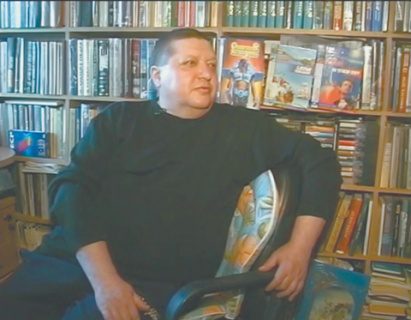
For decades, the “Interpresscon” science fiction festival served as a vibrant cornerstone of Russia’s speculative fiction scene, an itinerant gathering that brought together authors, critics, and enthusiasts in various picturesque suburbs of St. Petersburg – from Sosnovy Bor to Zelenogorsk. More than just a convention, it was a crucible for literary exchange, fostering a unique community where creative minds converged to discuss new ideas, celebrate achievements, and honor outstanding contributions to the genre. These annual convocations were not only pivotal for Russian sci-fi but also offered a fascinating lens into the broader cultural dialogue within the nation’s intellectual circles.
At the heart of “Interpresscon” lay its prestigious awards, particularly the “Bronze Snail” and the eponymous “Interpresscon” prize. The “Bronze Snail,” a highly coveted accolade, was personally bestowed by the legendary Boris Strugatsky, one half of the iconic Strugatsky brothers whose work enjoys international acclaim. The “Interpresscon” award, determined by a popular vote among all festival participants, recognized achievements across several categories: “Large Form” (novels), “Medium Form” (novellas), and “Small Form” (short stories). This democratic approach underscored the communal spirit of the festival, ensuring that the voice of the broader sci-fi community shaped its recognition of excellence.
A significant innovation arrived in 1997 with the introduction of the “Super-Short Story” category, championed by author Svyatoslav Loginov. Defying traditional page counts, the length of these micro-narratives was measured in kilobytes, typically amounting to no more than two pages. This pioneering category creatively adapted to emerging literary forms and publication methods, even accepting entries from fanzines—the non-professional, self-published, and limited-run periodicals that were often the primary outlets for experimental fiction during a period when mainstream fantasy and sci-fi publications were scarce. This openness reflected a dynamic spirit within the Russian literary landscape, eager to embrace new voices and unconventional formats.
It was against this backdrop that the author’s own work, including “A Tale of a Small Planet and a Sexual Revolution,” penned in 1996 as part of the “Tales for Idiots” series (later rebranded as “Tales for Friends”), found its way into the competition. Collaborating with his first publisher, Maxim Kachelkin, a literary supplement was created for a satirical fanzine, featuring the author’s collection. Given its fresh publication in this non-traditional format, “A Tale of a Small Planet and a Sexual Revolution” became a contender in the nascent “Super-Short Story” category, illustrating the category’s commitment to democratizing literary access.
The voting process itself often mirrored broader regional dynamics, albeit on a playful, localized scale. During this particular year, St. Petersburg-based attendees consolidated their votes for Anton Pervushin, then known for his prose miniatures in local newspapers. In a spirited counter-move, the Moscow contingent rallied behind the author’s entry. This friendly regional rivalry culminated in the author’s victory by a narrow margin, a testament to both the passion of the fan base and the engaging atmosphere of the festival. Such occurrences, while seemingly minor, offered a microcosm of the cultural interplay and regional pride that often characterize large national gatherings.
The “Interpresscon” prize itself was a distinctive artifact—at the time, a bronze, inverted teardrop adorned with intricate indentations, mounted on a base of green ornamental stone, possibly serpentine. Affectionately nicknamed the “alien egg” by enthusiasts, its design evoked the iconic imagery from Ridley Scott’s and James Cameron’s films, lending it a unique aesthetic appeal. While these awards, like many in speculative fiction, eschewed significant monetary value, they compensated with their artistry. Figures like Mikhail Uspensky, a celebrated author, had accumulated several such “Interpresscons” and “Bronze Snails,” which he endearingly called “чугунки” (roughly, “iron pots”)—bronze snails crawling over heavy stones. This emphasis on symbolic and artistic value over pecuniary gain was a hallmark of major Russian sci-fi festivals, echoing the precedent set by the “Aelita” festival in Sverdlovsk (now Yekaterinburg), whose main award for contributions to fantasy featured a beautiful spiral adorned with semi-precious stones.
However, the “Super-Short Story” award presented a curious exception. Whether to emphasize its unique status or for practical considerations, the organizing committee created a smaller, palm-sized version—a distinct contrast to the substantial trophies of other categories. The award ceremony itself was a moment of profound significance. With Boris Strugatsky presiding and fantasy enthusiast Alexander Sidorovich among the organizers, the author received the miniature sculpture from Svyatoslav Loginov. In a memorable acceptance speech, the author humorously remarked, “My ‘Interpresscon’ is small now, but I hope it will grow over time…” This prompted a quick-witted, albeit softly spoken, retort from editor Andrei Sinitsyn in the audience: “Just stroke it!” A humorous exchange that reportedly led to a gentle admonition from the tactful Boris Strugatsky to Sinitsyn later, underscoring the delicate balance between humor and decorum in such esteemed gatherings. This smaller award soon earned its own affectionate nickname: “Interpressconchik” (little Interpresscon).
The celebrations continued in the foyer, where laureates were congratulated amidst a bustling crowd of fans. Among them was Mikhail Uspensky, who received a large, standard “Interpresscon” for his novella “Serpent’s Milk.” Intrigued by the author’s diminutive prize, Uspensky exclaimed, “Wow! Yours is just like mine, only smaller! And I have to lug mine all the way to Krasnoyarsk… it’s so heavy. Let’s swap! You take mine, and I’ll take yours—it’ll be much lighter to carry!” Despite the author’s subsequent regret at not having made the exchange then and there, the incident perfectly encapsulated the convivial and slightly eccentric spirit of “Interpresscon” – a place where literary prestige mingled with personal camaraderie, and the value of an award was often measured in its unique story, not just its size. Today, the author possesses two “Interpressconchiks,” reflecting a later design change, each a cherished memento of a vibrant era in Russian speculative fiction.
